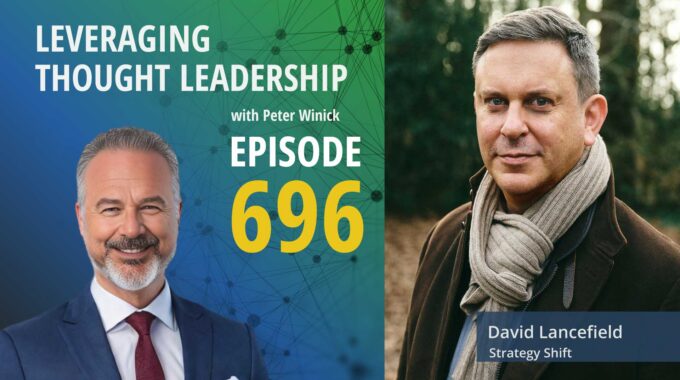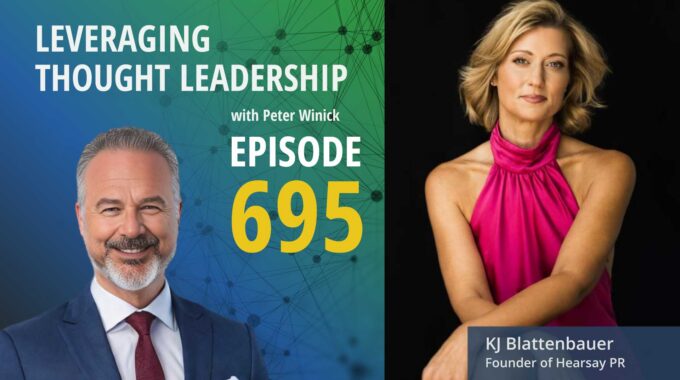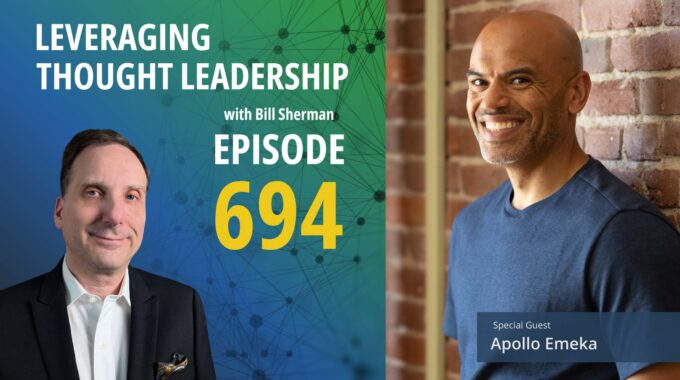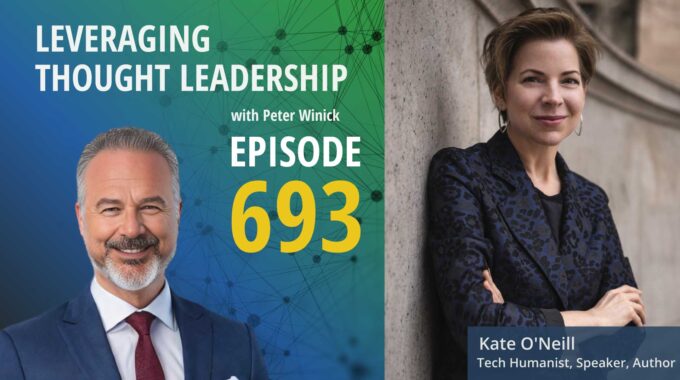The mindset shift from institutional brand to personal platform—and why it matters Strategy, leadership, and…
Thought Leader to Author | Kara Goldin
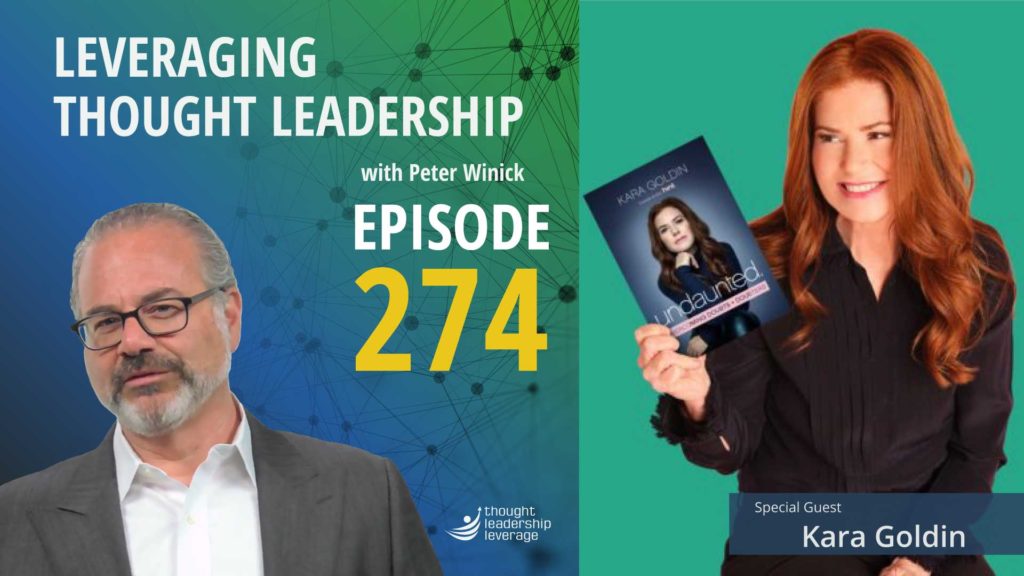
Publishing your first book on thought leadership
An interview with Kara Goldin about authoring her first book while continuing to be CEO at Hint Inc.
We are thrilled to have Kara Goldin join us again! Kara is the Founder and CEO of Hint Inc. She is the host of the podcast Unstoppable with Kara as well as a keynote speaker and first-time author of the best-selling book Undaunted!
Kara shares how the four-year process of writing the book played out, while she continued to run her company and host a podcast! In addition, she explains how continuous e-mails from customers influenced by her story of becoming an entrepreneur affected the stories she shared. Also, she explains how the stories in the book became therapeutic to share.
We discuss with Kara how the book has helped the business. Then, we look at how a book can be used as a recruiting tool for attracting talent to the company. Many first time authors have different objectives for their book, Kara talks about what she wants from the book and what success would look like for her.
If you enjoyed this episode and want to learn more about Kara and Hint Inc., check out episode 90!
Three Key Takeaways from the Interview:
- Thought leaders can take the stories of their experiences and hardships and turn them into a book or larger content to help their audience.
- A book about your thought leadership can be a good tool to attract people who will better understand you to want to work with you.
- Thought leaders who keep an open means of communication with their audience can use that to determine what content would be useful to them.
New books should be strategically planned to generate leads, showcase your content, and promote your reputation. If you are moving from thought leader to author, Thought Leadership Leverage can assist you with many aspects of your book writing and launch strategy.
Transcript
Peter Winick And welcome, welcome, welcome. This is Peter Winick. I’m the founder and CEO of Thought Leadership Leverage. And you’re joining us on the podcast, which is Leveraging Thought Leadership. Today, my guest is Kara Goldin. She’s the founder and CEO of Everybody’s Favorite Water, which is hint she’s best known for her award-winning hit Water, which is the leading unsweetened flavored water. And she is now the author of Undaunted. She’s an active speaker and writer, and she has her own podcast, which is unstoppable with Kara, and she interviews founders, entrepreneurs and other disruptors across a variety of industries. She lives in the Bay Area, and you can follow her on all her social handles like Kara Golden. So here we are. Welcome. So you are now officially a first-time author. Congratulations.
Kara Goldin I am. Thank you. I’ve been in the works writing this for four years, so I was finally excited to actually get the physical copies of the book and it’s pretty awesome.
Peter Winick So here’s the secret. Your friends will now all think you’re like 20 or 25 IQ points smarter because you’ve written a book and I won’t tell them If you want, you will get treated it like, come.
Kara Goldin On, they all think I’m smart.
Peter Winick Write smarter. You can always be smarter, right?
Kara Goldin Well, it’s funny, I, I, I was a minor in finance, and I had two roommates who were not minors in finance or majors in finance. And so I used to get the Wall Street Journal every day. Right. And so they, they decided it would be really funny when I was in college because I said, don’t throw out my Wall Street Journal. Read it this weekend with stacks and stacks. So they wallpapered my bedroom. And in college and with the Wall Street Journal one weekend, probably with a few beers and.
Peter Winick At least a few.
Kara Goldin Yesterday I was in the Wall Street Journal and had almost a page. And so the two of them just think they just think they’re so funny. They’re just going on and on about, you know, reminiscing about we knew that eventually she’d be in the Wall Street Journal because we were wallpapering her room with the papers long ago.
Peter Winick So I make sure they don’t sneak into the house. Right.
Kara Goldin I know. I know.
Peter Winick Write the nest on and watch out for.
Kara Goldin Yeah. So crazy.
Peter Winick So let me ask you this. You clearly weren’t sitting around one day going, hey, I’m running this, this world-renowned company. I got a bunch of kids I need something to do to fill the time. So maybe I’ll write a book. That probably wasn’t how that went down, was it?
Kara Goldin No, not at all. In fact, I didn’t. I knew a bunch of authors, but not really like entrepreneurs that wrote books. And I didn’t even look at books that were out there and think like, I can do this better in some way. For me, it was almost therapy. Like to write a lot of these stories down because I was out speaking and sometimes people would, you know, give a comment like, I enjoyed your talk. But right. By the way, you have a lot more courage than I do, or you don’t have doubts or you’ve never had failures. That’s not my story. And I was like, wait a minute. Like, that’s not true at all. Do I look like I’m, you know, super confident and that I don’t have fears or, you know, all of these different variables?
Peter Winick Well, the real vulnerable stuff. Right. So I think, you know, there’s really two types of books, books that could have just been a speech and ended there, you know, and then books like this that actually there’s not enough to get it across in an hour or 45 minutes. So talk to Kara 3 or 4 years ago that was about to write this book and tell her the difference between what she expected and how it played in terms of a process and what it took.
Kara Goldin Yeah. So I mean, I think more than anything, I started writing. I wasn’t in a hurry to get this book out and I was writing for four years. And so last year in June I had an agent which I had like two years in, and I just decided now it’s time. And my, my poor agent was like, Why now? Like you’ve been writing for four years and like, I’m done. Like, you know, I just need to either get it out there or put it to the side because I was really in a hockey stick and, you know, and it was there was a lot going on and I really wanted to see if there was like a market. But I also started hearing more and more about really this need that I felt out there for an entrepreneur to come out and actually share that. It wasn’t like, you know, one day I was zero and the next day I’m big write like I felt like there were this there was this like white space in there where I’m like, people actually need to hear the hard stories. And in particular, not that this is just for female entrepreneurs, but I found there aren’t any operating CEOs that I could find that are writing books that about. About sort of what it was like to grow the company while they were still at the company.
Peter Winick There’s what I mean. And that was part of why I was asking is usually most operating CEOs are sitting around going, geez, this week as well.
Kara Goldin How do I do.
Peter Winick Accounting, full board meetings, raising money, driving the business, blah, blah, blah. Great. Let me take on this other side project that will consume another chunk of my bandwidth. So what was the motivation? What were you know, you know, you said it took four years, but what motivated you to say because you could have stopped, Right? Nobody was like, this is how you need to make a living. But what motivated you to say, I need to do this, I need to get this out there?
Kara Goldin I think it was just consumers, like wanting to hear my story. I mean, ever since we started this company 15 years ago, the thing that has really driven me to keep going so many days when you know, life gets hard, you have it. You have a meeting with a retailer and it didn’t go the way you wanted or with an investor or potential investor or whatever. And I would get these emails. I mean, daily I get emails from consumers who are saying like, I love your product, you’ve helped me drink water. I heard your story today and you made me realize that I can actually do this. And I thought, wow, you know, that is the key thing that I heard over and over again from consumers around the hit product was help. And then I was actually hearing it about my own story and how it helped people to actually believe that if I just go try, maybe I can actually make some progress. And so that was the key reason why I said I can go and take these four years worth of a journal and actually turn it into something.
Peter Winick And how much of or how would you split the beneficiary, if you will, because you benefit, right, as writing this. It’s cathartic. It’s a forcing mechanism, etc.. But it also is incredibly beneficial to the brand. I mean, there isn’t a bigger I don’t mean this throwaway commodity than water, which is commoditized and bonded amazingly in an incredibly competitive market. But adding the storyline to it, like how do how does that sort of support the brand?
Kara Goldin Yeah, I mean, look, I think entrepreneurs advantage and especially I mean really in any category but especially in the beverage industry is actually the story behind the brand, right? And, and, and so we’ve continued to use that story to actually help people remember.
Peter Winick You are the face of the brand, right? And unlike, you know, if you’re an entrepreneur in a B2B cloud-based technology or whatever, there isn’t. There’s a CEO, but there isn’t necessarily a CEO like there isn’t a consumer product that is the face of the brand.
Kara Goldin Yeah, but you know, it’s interesting because I don’t think it’s limited to just B2C. I think it could be B2B. When you look at, you know, businesses that are, you know, Salesforce, I mean, Marc Benioff, I mean, saw this whole in the market and why there was a need. I mean, I think he has told the story. Does she still continue to, like tell the story? I mean, maybe not as much or not in the same way. But I really do believe what people remember is the is the story. And I think that it’s bizarre when you have a story, but you don’t have people like sometimes people are doing that. They say like, you know, and I’m like, you know, why don’t you actually say like, who? Every childhood story that I remember actually has a person, right? Or a character maybe not a person. Right. But it has a character in it. And so, again, I think that, yes, I’m the face of the brand, but I think it also started with my story. And it’s very often consumers remember this. And I mean, I remember the first time that I really felt like we were doing the right thing, like around telling a story. I was in Saint Simons Island or just off of Saint Simons Island at the Cloisters in Georgia, and it’s really where we founded the Peach Flavor. Like we were just eating a lot of peaches. And Georgia was like, so great. And I remember sitting out by the pool and I had a bunch of bottles, a hint. And this woman, I was talking to my daughter and this woman came by and she said, hey, you know, where did you get those bottles of hint? And I said, just down the road at the store, Harris Teeter. And she said, I’ve been wanting to try it. I had seen her on how I made my millions. And I said, Really? And of course my daughter is chuckling. Well, at the time, horrified. She jumps in the pool, runs away from me, and I said, Tell me the story. And it was amazing how she told the story. And then she said, I got to try that product because. Just hearing her story of how she started in her kitchen and she. Right.
Peter Winick Did you take off the hat like undercover boss art?
Kara Goldin I mean, you know, I have red hair. Like, I’m fairly, I think, like, easy to recognize. She had no idea who I was. Classic. At the end, my daughter comes back and she’s like, Did you tell her yet? And the lady said, What? And she said, and I, you know, looked at her sort of awkwardly, and I said, I work for Hint. And she said, what’s that lady like? And I was like, she is so awesome. I mean, I.
Peter Winick I can go on for days. Right? You’re right. If you’re enjoying this episode of Leveraging Thought Leadership, please make sure to subscribe. If you’d like to help spread the word about our podcast, please leave us a review and share it with your friends. We’re available on Apple Podcasts and on all major listening apps as well as at ThoughtLeadershipLeverage.com/podcasts. Let’s jump forward and it’s a year from now and all your dreams come true relative to the book, whatever that means. So what does that mean? What does success look like for the book? Because there’s different it’s I’m always fascinated by this because people, you know, can measure it by book sales, by impact, by conversations and start what does it mean for you?
Kara Goldin So I’ve never even understood, like the book sale number, to be honest with you. What?
Peter Winick Nobody does. Yeah.
Kara Goldin What I’m hear that does now is, you know, two weeks prior to launching, it’s doing pretty well. I mean, really well. Like, it’s. Which is amazing. But having said that, I didn’t sit there and do it for any other reason than to actually really help people. So I think in a year from now, if I start getting the same emails from people, letting me know that. I lost my job during Covid and I was really feeling stuck. And I read your book. Having no experience in an industry and I was able to kind of get out of the gate, knocked the walls down. Then I believe I’ve done something. I was talking to an editor yesterday on the phone who read the book. And, you know, it’s interesting because she said, I read it. I get given a lot of book tours. And she said, But I found myself going back to a few different things. For example, I went to the somewhat famous Arizona State University, and I and, you know, and I talk about in the book where, you know, I didn’t actually learn that there was anything wrong with my education until I moved to New York and happened to get a job at time. And she’s very lovely place, incredible product, but filled with a lot of people at the time who were in Ivy League schools. Yeah. So I thought when I got there, they all liked me, but they all wanted to know how I got a job here. And I just went into the HR Office and I and I got a job. And then I started realizing that I couldn’t actually change that piece. I had done well, so it was all good and all I could do would be actually to deliver, right. And I and so, and so what was classic is I had management coming to me and saying to any of her friends who graduated from Arizona State who you want to recommend for roles like Within.
Peter Winick So I loved that because, you know, early in our careers and even pre career, all that stuff matters so much. And then the dirty little secret is once you get out in the real world, you’re more I mean, there are exceptions judged on who you are, what you do, what you accomplish. And I mean, how many people do you know that have worked for you for years or colleagues or friends or neighbors? You have no idea where they went to school, if they went to school, because it’s not relevant to.
Kara Goldin You know, totally.
Peter Winick You know.
Kara Goldin And so that was like another. So she had this editor had said to me that she had gone to a state school and same thing like she landed there and, you know, she’s just a few years out of college. And she said, I’ve thought about the same thing that you wrote about and you have really inspired me because you’re a few years older than me and you’ve said she doesn’t care anymore. She owns it, right. And she’s fine. And she said, You really gave me hope. Thank you. Like those kind of things. Again, it’s a book about building hint. But if I can actually share those stories to help people get rid of their doubts, get rid of their doubters, here’s what you might want to say to people.
Peter Winick What about or has it crossed your mind that it could also be used again, going back to sort of hint a little bit as. You know, talent attraction. Like, wow, I’ve read your book and I want to work for you. I’ve read your book. And like, there’s all these other things where it just, you know, books sort of take on a life of their own. And one of the things I love about the work I do in books is there’s the self-selection piece. When I can give someone a book, the odds of them opening or not are one because who knows, right? The last data I got from Amazon said the average business book, nobody gets past the 18th page, which is depressing. But when someone comes to you and says, Hey, I read your book, you know, it’s sort of there’s a secret handshake. I dig your stuff. I know you. I think I understand how you might think or what you’re about or your values and all that. And it’s sort of a secret handshake of a way to expose your sort of values and persona and grit and all that other sort of fun stuff.
Kara Goldin Yeah, totally. I mean, I think I think it’s not only great for recruitment, but look, I share with people all the time that that we may not be the culture for everybody. I think like the danger of actually coming in to a company like mine is that I’ve actually worked in a lot of different cultures. I know about culture, like working at time, which, you know, had its culture. Then I worked at CNN, you know, Ted Turner drove that feeling.
Peter Winick From Gerry Levin to Ted Turner, right?
Kara Goldin Well, not Jerry. So, I mean, at the time, I mean, it was it was really I mean, it was it was just a culture of very ivy.
Peter Winick Very old school.
Kara Goldin Yeah. Always wearing a suit. And then all of a sudden, I went over to Ted Turner, who was like, it was on the other end of the spectrum. And it was crazy, right? But it was also things like screaming at people in hallways for doing something wrong like that would have never happened at time. Right, right, right. On the on the flip side of things at time, you know, as my boss used to say to me, and I always share this with people who will listen to me, you know, the younger generation in our company where boss used to say, judge people on what they do, not necessarily by what they say, because sometimes you’re working in a culture where everybody’s nice, right? That doesn’t mean that they’re on your side.
Peter Winick Called the Midwest, Right? Right.
Kara Goldin And it could be that.
Peter Winick You could be cultural from a geographic perspective.
Kara Goldin As well. But another thing I talk about and never look back and say, wow, that was a waste of time. That was a stupid thing. Like I actually when I then built my own company, I have a culture of I don’t love meetings. I actually, I, I basically say, if you want to do a meeting, then you need to tell people it why they’re doing a meeting and otherwise they don’t have to come to your meeting. It is not the standing meeting thing is like.
Peter Winick So let’s talk about that from a cultural perspective. So there’s a reason you came to that. You were on the painful end of not having choice earlier in your career and had to go to these meetings and sit there and watch the paint dry or do like I didn’t and look around the room and go, okay, 17 year average hourly rate. This. Wow, that was just a waste of ten grand or whatever. But so now it’s your rules, your game. Meetings need to happen, but they don’t need to happen at 2:00 on Tuesday because somebody years ago said we have a 2:00 on Tuesday meeting. So I would imagine you have a culture said, yeah, if we’re going to meet, we have a purpose to greet you. And if people don’t come to your meetings, that’s on you, right? To say, well, you know, you know, Peter runs a crappy meeting, I’m not going to his meeting. That was a waste of my time.
Kara Goldin It’s a waste of your time. And I think that, you know, you start to see people declining your meeting after a while, and then you start to say, well, maybe I need to reboot this meeting or cancel it. It’s people just don’t need to come to the meeting. I mean, you know, I.
Peter Winick Was going to say they get the hint, but I can’t do that here. Right.
Kara Goldin I remember really thinking about this some years back. A woman, a great person, came to work at hand and she had been at Frito-Lay for years. And it was constant standing meetings. And she said to me, So great. Like, I actually get out of the office by five, 530. Like, it’s amazing. I can go on a run, I can do all this stuff. And I was like, like, how many meetings were you in? And she was like, we started meetings at 9 a.m. and didn’t get out to three. And then I was like, When did you do the work? Right, right. And then I’m trying to like, they’re all my bosses meetings. But she said, it’s crazy because I actually want to have some kind of downtime along the way.
Peter Winick Which is where the creativity comes from. And I mean, downtime is so not overrated. It’s not I mean, I think it gets a bad brand by calling it downtime. It’s actually refresh time. It’s actually when the brain sort of reboots itself. So as we start to wrap, give us a couple of closing thoughts on why does someone out there might choose to take the path that you did and go for it and write the book and why you might not, because it isn’t for everyone. It isn’t something for everyone.
Kara Goldin So you say, So are you asking the path of being an entrepreneur or an author?
Peter Winick This is a new one for, you know, the. Yeah.
Kara Goldin Yeah. So you know. I think very similarly to how I thought about actually starting, can’t it? I am not the type of entrepreneur or the type of author that would have written a book. If I actually saw that one was out there that was similar.
Peter Winick That that was that was similar to what you were doing.
Kara Goldin But how does that it’s I sort of think this term is overused, but thought leadership around doubts just is one piece of it, but also that somebody can actually look at as kind of a mentorship. Right. And somebody that kind of gets them gets them out of the gate. I mean, I was on another call earlier today and somebody said to me, Do you think I need a coach? Do you do you ever I mean, that’s kind of a topic that a lot of people talk about today. Like it’s like everybody’s got coaches, right? Yep. And I said, what problem are you trying to solve? And she said, I don’t know. And I said, Figure that out first and figure out if that’s what it is. And how would.
Peter Winick You know what coach to hire if they did a good job? If you’re making progress, is it you’re hiring a coach because it’s, you know, an A multi so you want to multis like that. I know.
Kara Goldin Exactly and so what you’re.
Peter Winick Trying to accomplish.
Kara Goldin Right and so I think so often even there’s books like mine that actually help you to think about like okay I just read this book undaunted. And you know what I’ve realized is that I have problems building up this wall in front of me, or I should say knocking down the wall in front of me that it’s hard for me to do that. So I don’t know if it’s a coach or therapist or whatever. I mean.
Peter Winick Somebody.
Kara Goldin Somebody. Yeah. I mean, I always and I don’t think it’s just about business too. I think it’s just about being an athlete. I have a niece who is a professional soccer player and for a while she had a huge problem. She thought she couldn’t do something and she went to a sports therapist and it basically rewired her to actually know that she could. Yeah. And I’ve thought a lot about this, too, that I think we get in our own way so much of the time and we rely on our friends and family who they don’t want to see you hurt. So they’ll, they’ll agree with you when they hear you doubting, they’ll just feed the fire, right. And they’ll just tell you. So I think it’s just at the end of the day, you have to be strong enough to figure out how to break that down. And that’s hopefully what the book does.
Peter Winick Cool. Well, I appreciate your time. I wish you the best on the book and congratulations on entering the world of published author.
Kara Goldin Adam Thank you. I really, really appreciate it. And yeah, and if anybody wants to reach out, I love to hear from people. It’s Kara Goldin with an I and I would love to say hi.
Peter Winick Great. Thank you so much.
Kara Goldin Thank you.
Peter Winick To learn more about Thought Leadership Leverage, please visit our website at Thought Leadership Leverage dot com. To reach me directly. Feel free to email me at Peter at ThoughtLeadershipLeverage.com. And please subscribe to Leveraging Thought Leadership on iTunes or your favorite podcast app to get your weekly episode automatically.


